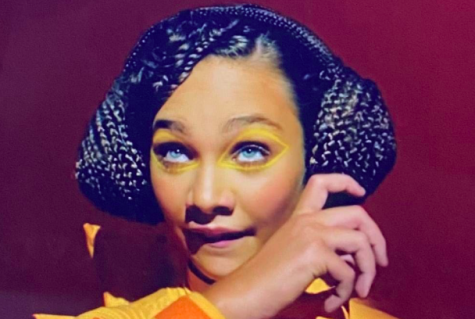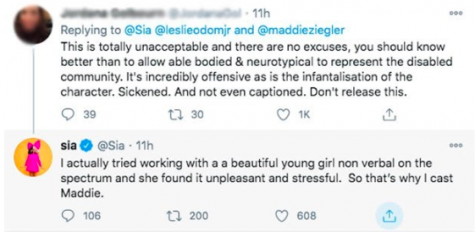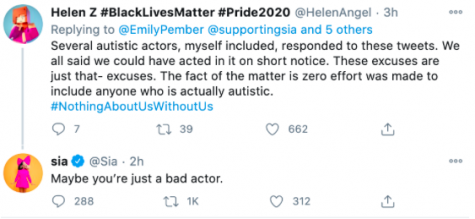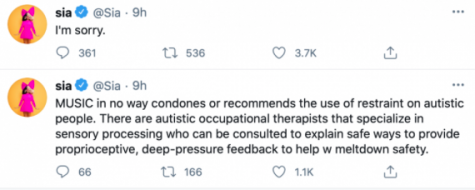Harm and No Good: Sia’s ‘MUSIC’ Hurts Autistic Community
Sia’s debut movie, “Music,” is an offensive representation of neuro-atypical individuals.

Sia is under fire from critics who say her portrayal of people with Autism is irresponsible.
March 10, 2021
Putting the cherry on top of a timeline of controversy, singer-songwriter Sia’s musical drama “MUSIC” shines a light on the misrepresentation of the autistic community in Hollywood.
“MUSIC” depicts the story of a teen with the very same name, played by Maddie Ziegler, with autism. After the death of her grandmother, Music is under the custody of her half-sister and recovering addict, Zu.
The premise of the movie is promising in itself, with the goals of forming family bonds and raising awareness to the autistic community. However, the execution of the movie, both in the script and in the casting of the actors, is poor.

When the trailer first came out, critics and members of the autistic community were quick to criticize Sia for the casting and mocking tone. Sia was quick to respond to tweets saying that people need to watch the movie before judging it. When others questioned why she did not cast a girl on the autistic spectrum for Music, Sia generalized the autistic community by revealing that her original actor, a girl with autism, could not handle the role.
The movie was nominated for two Golden Globe awards despite receiving a review of 9% on Rotten Tomatoes. The critic consensus is that the film is an “offensive in its depiction of autism — and painfully misguided in essentially every respect.”
Despite Sia’s response to the backlash and her hopes that the views of critics would change after the movie came out, “MUSIC” remains one of the most offensive movies to come out this year.
As a sister of a brother who is on the autisitc spectrum, the film disgusts me. One of the most obvious controversial parts of the movie is Maddie Ziegler’s depiction of Music. Ziegler embodies all of the autistic stereotypes in the movie, from the ticks, the breakdowns, to the way she talks to others.
Ziegler’s portrayal is a mockery of people with autism, and Sia further spreads a false narrative that people with autism act this way and are a burden to others. Even more, from what I have witnessed in my day to day life, the way Sia interprets people with autism is typically how many bullies mock their peers on the spectrum.
Sia defends casting Ziegler on Twitter with one response that said, “I actually tried working with a beautiful young girl non-verbal on the spectrum and she found it unpleasant and stressful. So that’s why I cast Maddie.”
Many autistic actors were quick to respond, saying that “there are no excuses” for allowing an able-bodied individual to represent a child on the spectrum.
To which Sia responded to one girl with “Maybe you’re just a bad actor.”
An issue in Hollywood right now is the portrayal of autistic and others with disabilities by neurotypical individuals. By not casting neuro-atypical individuals, the stigma surrounding the autistic community spreads that autistic people are not “capable” of playing a role in a big, upcoming movie. Which is not the case.
I have grown up with a brother with autism my whole life, and the assumptions made by Hollywood, my peers, teachers, movies, or any form of popular media are wrong. Just because someone is autistic does not make them any less of a person, nor does it make them “less functioning.” Everyone is just as functioning as the next person, and are capable of playing a role in the film.
The portrayal of a neuro atypical individual in “MUSIC” does not help raise awareness to the autistic community, but it just further enforces the stigma surrounding it. The movie makes viewers believe that individuals with autism are a burden to their family – such as Zu being forced to take care of Music in the movie – or that people with autism are “low functioning.”
https://twitter.com/JuliaBrookshir3/status/1364778025586466816?s=20
When a neurotypical actor is given the role of an autistic character, they often further spread the stereotypes and misconceptions surrounding the autistic community. If an autistic actor is assigned this role, they do not play into these stereotypes. Autistic actors should be able to represent themselves without neurotypical actors having to do it for them. They can reclaim what it means to be an autistic actor and prove to Hollywood that they can act and should be treated just as any other actor is.
 Even the depictions of how to take care of children with autism are poor in the movie. I discussed the movie with my brother who was just as disgusted with the movie as I am. One of the main things that stuck out to him about the movie was how the adults managed Music’s panic attack; two older characters pinned the girl to the ground and wouldn’t let her move to calm her down. My brother expressed to me how this act can further stress and freak out a person with autism. And, because of the movie, it spreads false information to the viewers on how to handle a child with autism.
Even the depictions of how to take care of children with autism are poor in the movie. I discussed the movie with my brother who was just as disgusted with the movie as I am. One of the main things that stuck out to him about the movie was how the adults managed Music’s panic attack; two older characters pinned the girl to the ground and wouldn’t let her move to calm her down. My brother expressed to me how this act can further stress and freak out a person with autism. And, because of the movie, it spreads false information to the viewers on how to handle a child with autism.
Sia’s ignorance about how to handle an autistic child in the midst of a meltdown suggests she did not do ample research prior to filming. 
The movie is not something to be praised or supported. The only appropriate way to talk about this movie is to discuss how it harmed the autisitc community and how to improve the representation of neuro-atypical individuals for the future of Hollywood.
Despite the intentions of Sia when producing this movie, the execution of her idea was poor. “MUSIC” has been deemed to be one of the most offensive movies of the year, and I believe that is the only title it should earn.








D. Schneider • Mar 12, 2021 at 11:19 am
Carley, thank you for writing about this. While representation and awareness is improving, there’s still a long way to go.